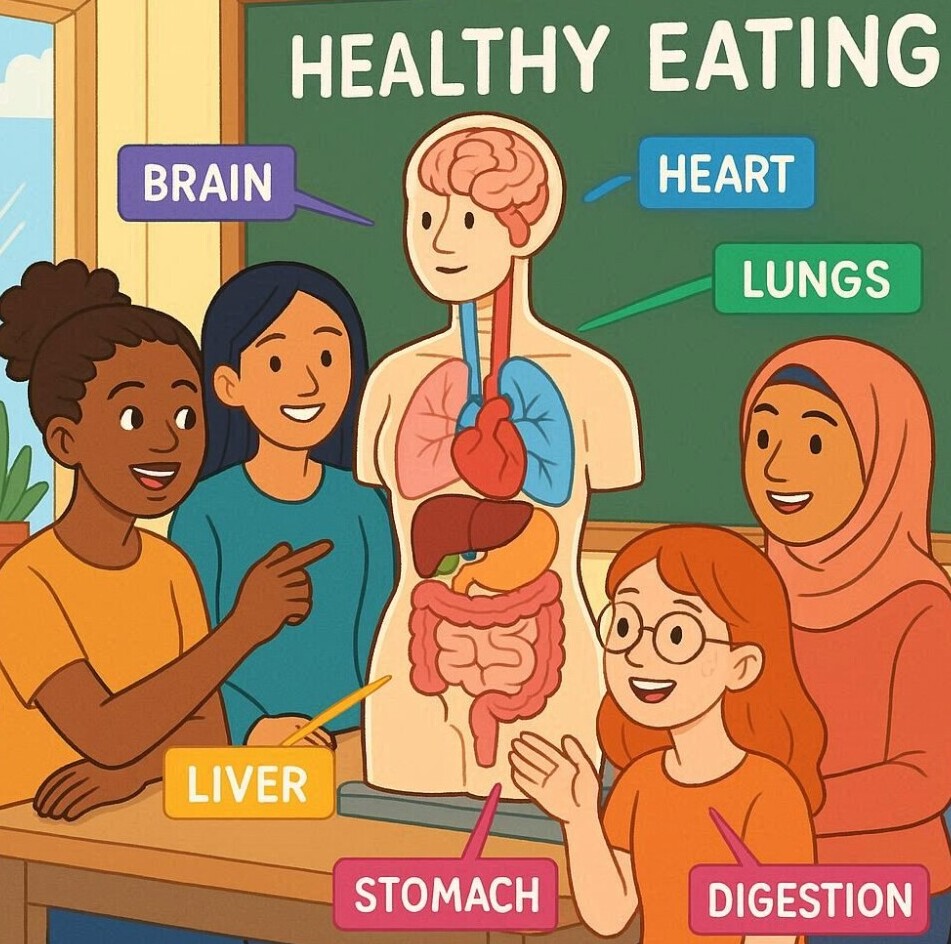The Science Of Optimal Nutrition: How Proper Fuel Powers
How Proper Fuel Powers Women’s Vital Organs
Introduction:
Every bite you take is a biological directive—a command that either strengthens or strains your body’s intricate systems. As women, our organs perform extraordinary feats daily, from hormone regulation to toxin removal, all while adapting to life’s changing rhythms. But these systems don’t operate in isolation; they require precise nutritional inputs to function at peak capacity.

This is the unvarnished truth: what you eat directly determines how efficiently your body repairs, detoxifies, and energizes itself. When properly nourished, your organs work in seamless harmony. When deprived, they compensate until they can’t—and that’s when symptoms arise.
Let’s examine the exact mechanisms by which nutrition powers—or undermines—your most critical organs, and how to optimize each system through strategic food choices.
1. The Gut: Your Microbial Command Center
Key Functions:
– Digests food and absorbs nutrients
– Houses 70% of immune cells
– Produces neurotransmitters like serotonin
Nutritional Requirements:
- Fiber (25–35g daily): Feeds beneficial gut bacteria that reduce inflammation-Best sources: Raspberries (8g/cup), lentils (15g/cup), chia seeds (10g/oz)*
- Polyphenols Act as prebiotics to support microbial diversity-*Best sources: Green tea, dark chocolate, blueberries
- Hydration (0.5–1 oz water per lb body weight): Maintains mucosal lining
Consequences of Deficiency:
– <5g>
– Chronic dehydration → Constipation → Toxin reabsorption
– Processed foods → Leaky gut syndrome → Systemic inflammation
Action Plan:
1. Start meals with bitter greens (arugula, radicchio) to stimulate digestive enzymes
2. Consume probiotic foods (kefir, kimchi) with prebiotic foods (garlic, onions)
3. Chew each bite 20–30 times to activate salivary amylase
2. The Liver: Your Biochemical Processing Plant
Key Functions:
– Filters 1.4 liters of blood per minute
– Metabolizes hormones and medications
– Stores essential vitamins (A, D, E, K, B12)
Nutritional Requirements:
- Sulfur compounds: Activate Phase II detox pathways-Best sources: Broccoli sprouts, garlic, pasture-raised eggs
- Antioxidants: Neutralize free radicals from toxin processing-Best sources: Turmeric, berries, pecans
- Choline (425mg/day minimum): Prevents fatty liver-Best sources: Beef liver (356mg/3oz), eggs (147mg/large)
Consequences of Deficiency:
– High fructose intake → NAFLD (non-alcoholic fatty liver disease)
– Low choline → Impaired fat metabolism → Liver congestion
– Alcohol + processed fats → Oxidative stress → Liver cell damage
Action Plan:
1. Consume cruciferous vegetables daily (aim for 1 cup cooked)
2. Support glutathione production with whey protein or NAC supplements
3. Avoid eating within 3 hours of bedtime to allow liver regeneration
3. The Kidneys: Your Precision Filtration System
Key Functions:
– Filter 180 liters of fluid daily
– Regulate blood pressure via renin production
– Balance electrolytes (sodium, potassium, magnesium)
Nutritional Requirements:
- Potassium (2,600–3,400mg/day): Counters sodium’s hypertensive effects -Best sources: Avocado (975mg each), spinach (840mg/cooked cup)
- Citrate: Prevents kidney stone formation – Best sources: Lemons, limes, melons
- Omega-3s: Reduce inflammatory markers that strain nephrons -Best sources: Wild salmon, sardines, walnuts
Consequences of Deficiency:
– Chronic dehydration → Concentrated urine → Kidney stones
– High sodium + low potassium → Hypertension → Glomerular damage
– Excess animal protein → Increased urea production → Filtration overload
Action Plan:
1. Drink 1/2 body weight (lbs) in ounces of water daily (add lemon for citrate)
2. Consume potassium-rich foods with each meal
3. Limit processed foods with hidden sodium (bread, sauces, cured meats)
4. The Endocrine System: Nutritional Hormone Regulation
Key Functions:
– Produces and regulates sex hormones
– Manages stress response
– Controls metabolic rate
Nutritional Requirements:
- Healthy fats (50–70g/day): Building blocks for hormones -Best sources: Extra virgin olive oil, avocado, wild salmon
- Magnesium (320–420mg/day): Modulates cortisol -Best sources: Pumpkin seeds (156mg/oz), dark chocolate (64mg/oz)
- Iodine (150mcg/day): Essential for thyroid function -Best sources: Seaweed, cod, yogurt*
Consequences of Deficiency:
– Low fat intake → Impaired hormone production → Irregular cycles
– Magnesium deficiency → Heightened stress response → Cortisol dysregulation
– Iodine insufficiency → Hypothyroidism → Fatigue + weight gain
Action Plan:
1. Consume 1 tbsp quality fat with each meal
2. Soak in Epsom salt baths 2–3x weekly for transdermal magnesium
3. Use iodized salt or consume seaweed weekly
 The Optimal Nutrition Protocol
The Optimal Nutrition Protocol
Daily Foundations:
- Hydration: Start with 16 oz water upon waking
- Protein: 20–30g per meal for tissue repair
- Plants: 5+ cups colorful vegetables for phytonutrients
- Fats: 1–2 tbsp healthy fats per meal
- Fiber: 10g per meal for gut health
Weekly Enhancements:
– Liver or shellfish for micronutrients
– Fermented foods for gut flora
– Bone broth for collagen/glycine
Conclusion:
Your organs are not passive recipients of nutrition—they’re dynamic systems that respond biochemically to every dietary input. By understanding these mechanisms, you gain the power to:
- Prevent dysfunction before symptoms appear
- Optimize performance at the cellular level
- Extend health span through targeted nourishment
The science is clear: strategic nutrition is the most powerful lever for lifelong vitality. Implement one system-focused upgrade this week, and observe how your body responds. This isn’t guesswork—it’s biological certainty.
Ready to upgrade your organ nutrition?
Begin with these priority actions:
1. Run a 3-day food log to identify gaps
2. Select one organ system to focus on this month
3. Measure improvements in energy, digestion, or biomarkers
Your body’s potential awaits.
Why This Approach Works:
- Evidence-based: Cites specific nutrient amounts and physiological impacts
- Action-oriented: Provides measurable daily/weekly protocols
- System-focused: Explains interconnections between organs
Let’s start today. Little steps towards your Best Life!
